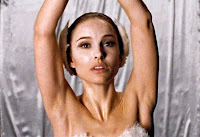 I have something of a soft spot for science fiction and fantasy films. I'm always intrigued by them even if all evidence points to the result being less than stellar. Ridley Scott's Alien is one of the most fundamentally sound science fiction and horror films in existence so naturally it provides lots of intrigue into the happenings of Prometheus knowing that its part of the same franchise. Unlike the Star Wars prequels however, don't expect this to be a game of connect the dots. It successfully stands on its own and creates intrigue with original material.
I have something of a soft spot for science fiction and fantasy films. I'm always intrigued by them even if all evidence points to the result being less than stellar. Ridley Scott's Alien is one of the most fundamentally sound science fiction and horror films in existence so naturally it provides lots of intrigue into the happenings of Prometheus knowing that its part of the same franchise. Unlike the Star Wars prequels however, don't expect this to be a game of connect the dots. It successfully stands on its own and creates intrigue with original material.The title Prometheus of course ties in the Greek titan who was punished for bringing fire to man. In the film, Dr. Elizabeth Shaw (Noomi Rapace) and the crew of the ship Prometheus travel to a distant moon to discover the origins of mankind, but like the titan of myth they are punished for their well meaning attempt as they discover that the conditions are less than friendly.
The focus on the origin of man rides the line very well between religion and science, even bringing up the two in dialogue and successfully including all audience members by explaining why both sides of the debate should find interest in the endeavor. It reminds me of Brian De Palma's 2000 film Mission to Mars which also attempted to tackle the origin of life on Earth question but did so in a very frustratingly simple way. Prometheus walks on comparable turf with its topic but achieves a higher level of intellect and originality.
Similar to the original Alien film, unanswered questions enhance the mystery however in Prometheus some of the unanswered questions create confusion and frustration. An android named David is probably the most interesting character but his motives are never clear throughout the film. He is played by Michael Fassbender in a soulless manner that is more reminiscent of the replicants in Ridley Scott's Blade Runner (supposedly this was Fassbender's intention). It was clear in both Alien and Aliens whether the androids were villainous or helpful but David's actions seem to contradict each other at times and I walked out of the theatre feeling like I never really grasped his nature.
Other behaviors and reactions by characters come off as awkward and illogical, which unfortunately taints the value of the mystery and mythology that the filmmakers are trying to create. It is refreshing that Prometheus requires us to actually digest its material, a far cry from typical summer flicks (especially ones that claim to be the fifth installment of a long franchise), and it leaves us with promise of a sequel that will hopefully present the same thrilling lore with an improved structure.





